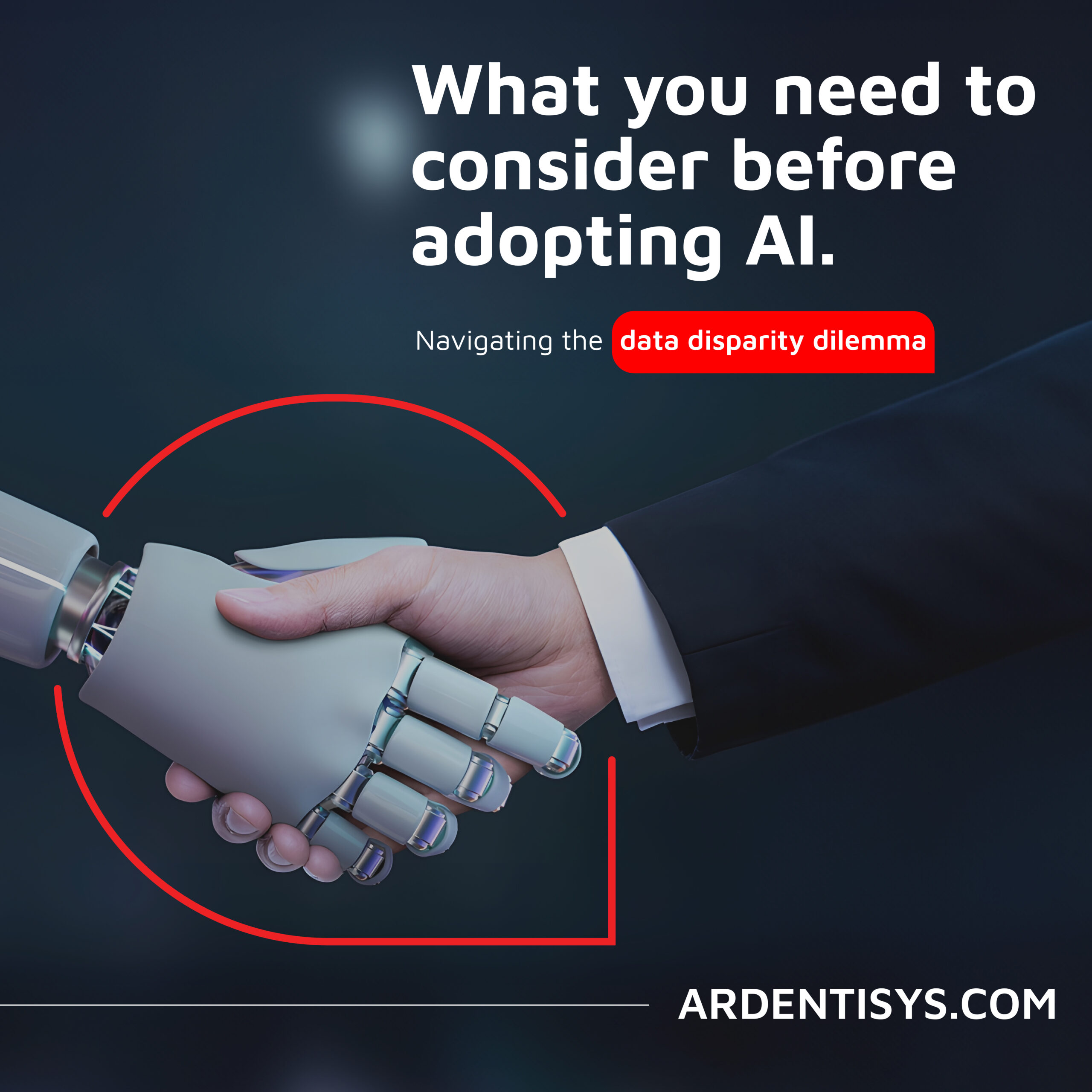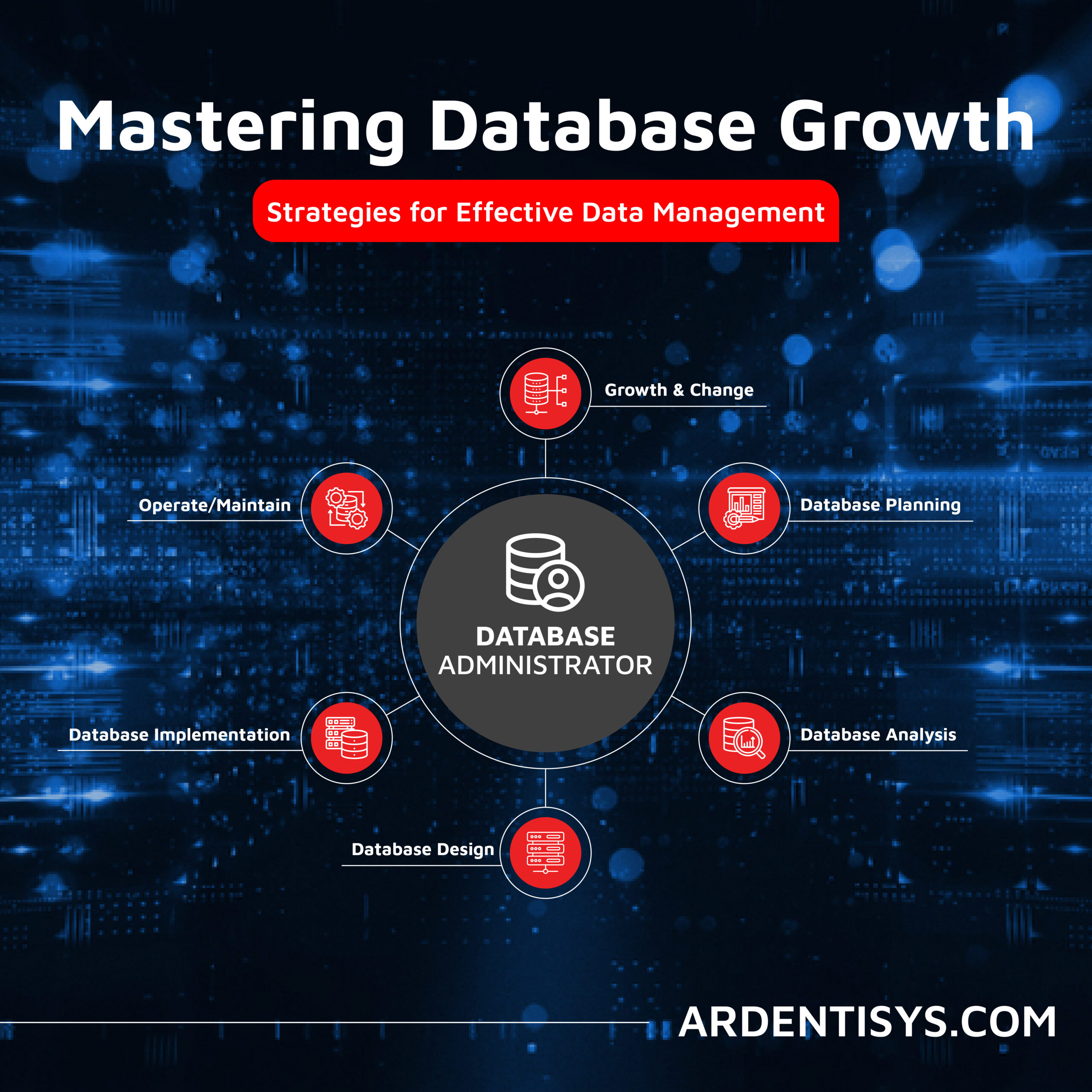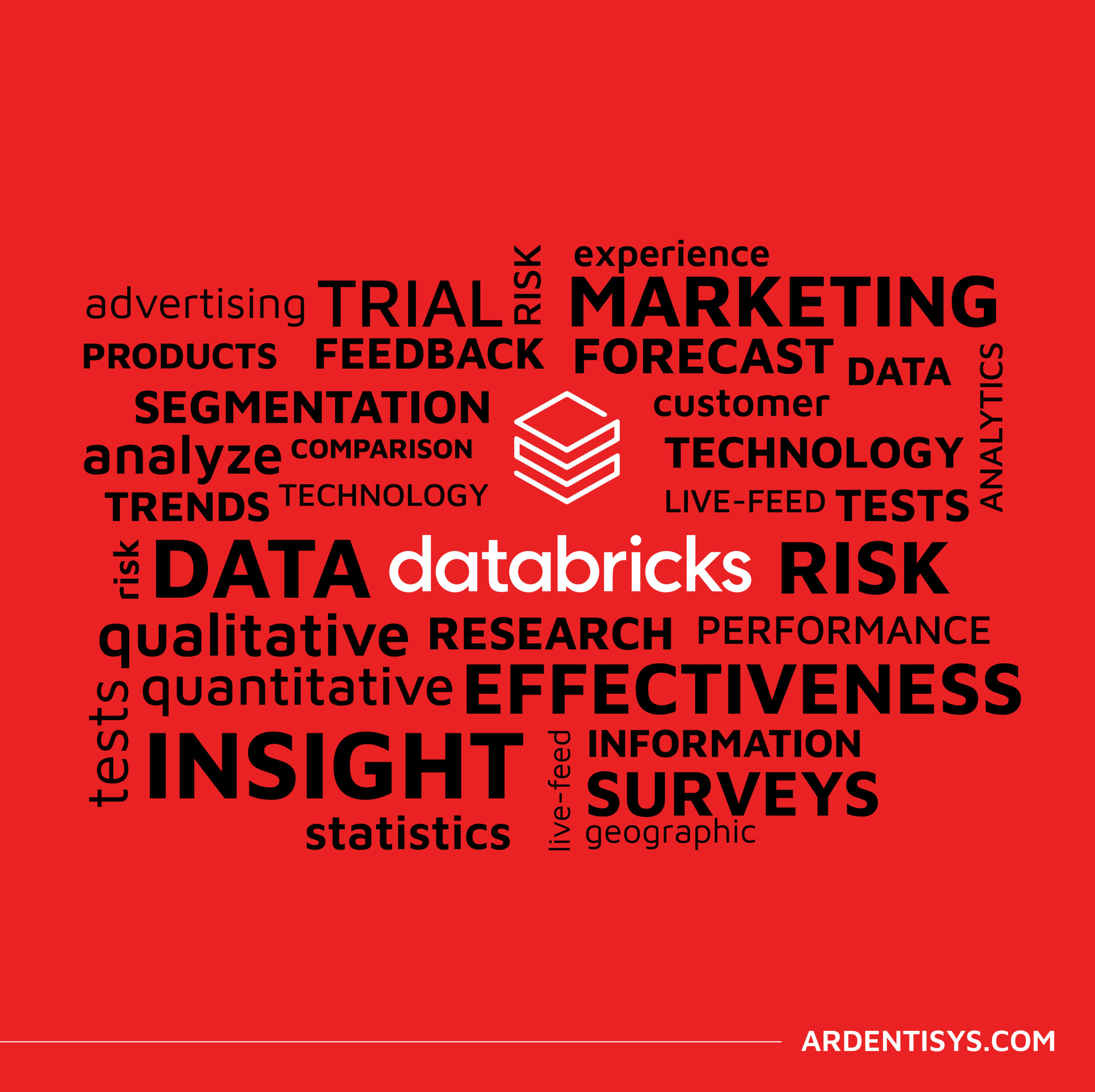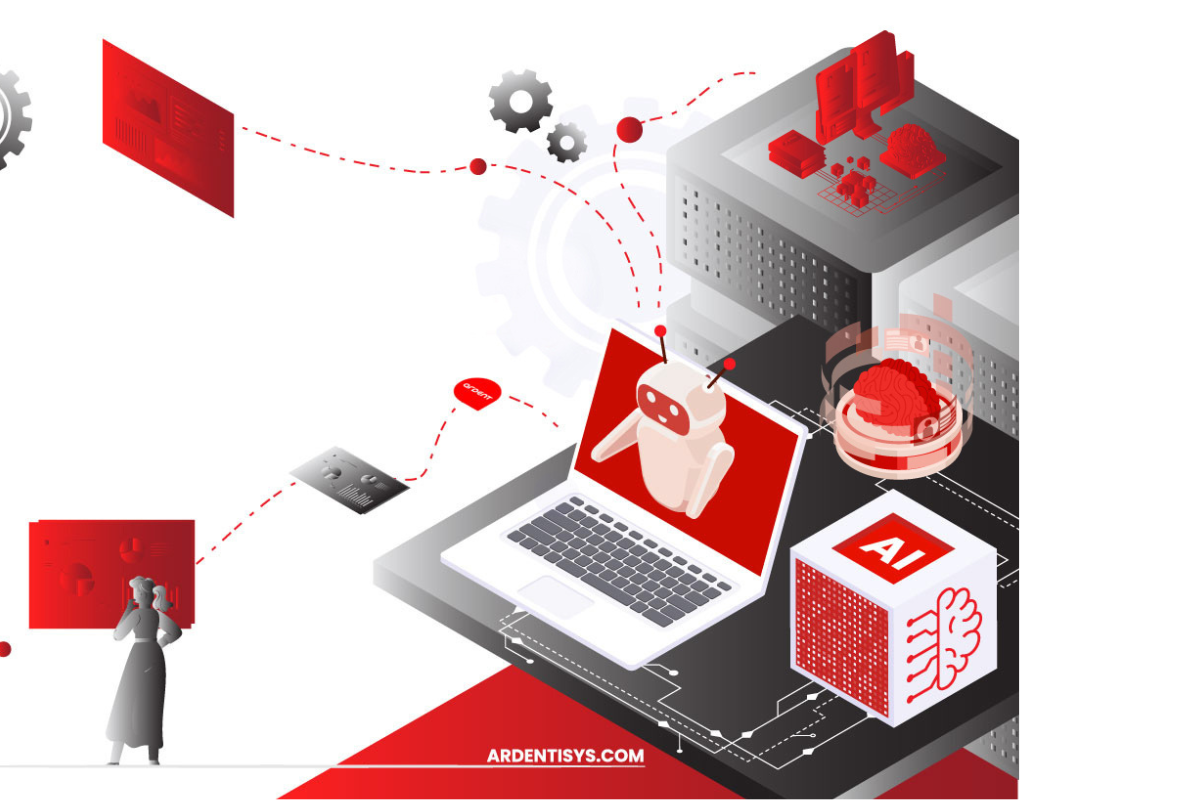Are you considering AI adoption? We summarise our learnings, do’s and don’ts from our engagements with leading clients.
12 September 2023 | Adam Nichols

How Ardent can help you prepare your data for AI success
Data is at the core of any business striving to adopt AI. It has become the lifeblood of enterprises, powering insights and innovations that drive better decision making and competitive advantages. As the amount of data generated proliferates across many sectors, the allure of artificial intelligence (AI) and machine learning (ML) is growing stronger and stronger, promising transformative potential across industries. However, the path to successful AI adoption is laden with challenges, particularly when it comes to data.
While the excitement around AI is palpable, organisations must recognise that without a solid foundation of well-prepared data, AI initiatives are prone to failure. This article delves into the critical factors to consider before adopting AI, focusing on the intricate web of data considerations that underpin AI success.
Navigating the Data Disparity Dilemma
Data science and AI/ML are undoubtedly game-changers, but the current landscape remains code-heavy and largely limited to niche use cases and siloed projects. Many analysts and managers still find themselves unable to harness the full potential of data-driven insights due to a lack of accessible tools and expertise, access to data and data quality.
The disparity between data generation and data utilisation highlights a key challenge that must be addressed before AI adoption can be successful.
The first step for any business is to become familiar with AI and what it can do for your business. Start by identifying the problems you want AI to solve and prioritise these according to its value to the business. Acknowledge the internal capability gap and bring in experts if and where needed. Start small and set up a pilot project to test the feasibility and impact of AI. Support new AI-based processes with agility and re-evaluate your business strategy regularly.
The Importance of Data Preparation
At the core of AI lies high-quality, well-prepared data. The saying "garbage data in, garbage data out" holds particularly true for AI outcomes. Before organisations can even contemplate training and deploying AI models, they must ensure that their data is meticulously prepared. This preparation entails several crucial steps (Extract, Transform, Load) that collectively shape the foundation of successful AI adoption. These steps are embedded in Data engineering and data science processes, tools and standards which must not only precede data training exercises but become embedded in the on-going business operation.
Common challenges which businesses face when ensuring their data quality include:
- Duplicate data.
- Inaccurate or outdated data.
- Ambiguous or inconsistent data.
- Hidden data.
- Insufficient data for the required task.
- Excessive data for existing structure to handle.
- Unexpected downtimes or system failures.
- Ensuring the provision of staff with the right skills
Data Collection and Integration
Data comes in a multitude of forms: structured, semi-structured, and unstructured. A data warehouse is formed of structured data from relational databases (rows and columns). But many different forms of data exist that also have real value to our business, and from which we want to extract all relevant information. These originate from all kinds of sources including semi-structured data (CSV, logs, XML, JSON and recognisable formats such as invoices) and unstructured raw data such as emails, documents, PDF's, binary data and vector databases with images, audio and video content. This data is often stored in a Data Lake, a storage repository that can rapidly ingest large volumes of raw data in its native format. A Data Lakehouse combines the best features of these two types of repositories out-of-the-box, increasing productivity, better collaboration, eliminating data siloes and streamlining the overall data management process.
We've showcased the paramount importance of effective vector data preparation for successful AI adoption, achieving an impressive 80% improvement in data turnaround using Databricks Data LakeHouse for our client, a broadcast media unicorn. Unstructured Vector databases (VDBs) play a pivotal role in modern AI applications. They employ advanced indexing tailored to specific data points, enabling seamless data handling and faster intelligent search algorithms. Well-organized vector data serves as the fuel for machine learning models, enabling them to generate accurate predictions, classifications, and outputs.
The integration of VBDs in Machine Learning represents a transformative stride, especially for executives focused on generative AI projects. Understanding the significance of VDBs in conjunction with models like LLMs is crucial for unlocking the full potential of AI, fostering innovation, and gaining a competitive edge in today's tech-driven landscape.
It's important to note that the infrastructure and preparation required to support these projects are often underestimated. Achieving a cohesive dataset ready for analysis necessitates aligning the underlying concepts and definitions of variables or units to yield measurable values. These steps lay the foundation for a comprehensive dataset poised for in-depth analysis.
Data Cleaning and Pre-Processing
Raw data is rarely ready for AI consumption. Inconsistencies, errors, and missing values can plague datasets, leading to skewed outcomes. Before integrating data into models like LLM, it must undergo thorough cleaning, ensuring it's devoid of duplicates, irrelevant content, and errors. This ensures the model learns from accurate, high-quality information, enhancing its predictive capabilities. Data cleaning and pre-processing performed by Data Engineers involves removing this noise, addressing missing values, and rectifying inconsistencies. Additionally, ethical considerations come into play here, as organisations must be vigilant against biased data that could perpetuate unfair AI outcomes.
Data Transformation
Data must be transformed into a format suitable for AI model training. This involves scaling numerical features, normalizing distributions, and encoding categorical variables. Transformation standardises data, making it compatible with the algorithms that AI models employ.
Data Labelling and Annotation
Supervised learning, a dominant approach in AI, requires labelled data for training. This step involves manual or automated annotation of data to teach AI models the correct associations. Data labelling can be laborious and time-consuming, but its accuracy is pivotal for AI success.
Data Quality Assurance
Maintaining data quality is an ongoing challenge. Establishing robust quality checks is crucial to identify outliers, detect anomalies, and track shifts in data distribution over time. These issues can arise throughout the life cycle of your data so it is important to consider continually monitoring data ingestion to ensure that AI models remain dependable and accurate in dynamic environments.
Data Storage, Management and Scalability
As datasets grow, efficient storage and management become paramount. Scalable storage solutions, well-designed databases, and streamlined data pipelines are essential to ensure data accessibility and integrity. Whether dealing with real-time or batch processing, the data infrastructure must be agile and resilient. Addressing growth projections, volume of data, and capacity planning is an important task carried out by the Data Infrastructure and business teams.
To ensure that the infrastructure and data streams perform as they should, Ardent provides tailored solutions that engage automated data monitoring and observation solutions combined with manual human oversight to monitor the "unknown unknowns" that are sometimes beyond the realm of AI capability, making sure that your infrastructure is fully guarded against underperformance, or service breaks.
Where there is insufficient infrastructure to handle the vast amounts of data, it is vital to consider the question to modernise or migrate your data warehouse/data lake to build a future proof solution that will scale with your business.
Data Security and Privacy
Data security and privacy stand as paramount considerations, non-negotiable in any circumstance. Both regulatory mandates and internal policies governing data usage, storage, and sharing must be rigorously upheld. Failing to do so may lead to severe legal consequences and significant reputational harm.
The safeguarding of sensitive information necessitates uncompromising measures to prevent breaches and maintain adherence to legal and ethical standards. Establishing a robust foundation of data governance is imperative to ensure that AI endeavours operate firmly within these boundaries. Rigorous security protocols must be integrated across the entire data lifecycle, instilling confidence in both customers and stakeholders, and thereby minimising the risks associated with biased data outcomes and privacy infringements.
Version Control
In the dynamic realm of AI, version control for datasets and data pipelines is invaluable. Changes made to data, pre-processing techniques, or models must be tracked meticulously to maintain the data ownership chain of custody, and trackable audits that help to identify points in the data lifecycle. Version control preserves a historical record, aiding transparency, reproducibility, and troubleshooting.
How Ardent can help you prepare your data properly
Data-driven companies that do well in these areas will produce more and more quality data that builds a culture of continual improvement, strengthening their market position. Having the tools, technologies, and experience to handle your data correctly is a business-critical operation, one that can affect your ability to deliver your products and services, and your budget.
By bringing in experts who are highly skilled in data science and data engineering, you can focus your time and efforts where you can do the best for your business, secure in the knowledge that you are supported by high-quality data, and appropriate methods for handling it.
Get in touch today and discover for yourself how Ardent can help you manage your data, and implement appropriate AI that will benefit your business now and in the future.
For more information about implementing or optimising your AI Data strategy, please get in touch with me Adam Nichols at adam.nichols@ardentisys.com or call on 07459 798 870
Ardent Insights

Overcoming Data Administration Challenges and Strategies for Effective Data Management
Businesses face significant challenges to continuously manage and optimise their databases, extract valuable information from them, and then to share and report the insights gained from ongoing analysis of the data. As data continues to grow exponentially, they must address key issues to unlock the full potential of their data asset across the whole business. [...]

Why the Market Research sector is taking note of Databricks Data Lakehouse.
Overcoming Market Research Challenges For Market Research agencies, Organisations and Brands exploring insights across markets and customers, the traditional research model of bidding for a blend of large-scale qualitative and quantitative data collection processes is losing appeal to a more value-driven, granular, real-time targeted approach to understanding consumer behaviour, more regular insights engagement and more [...]

Why do Data Scientists rely on Ardent’s Data Engineering expertise for Data Preparation?
The different roles of a Data Scientist and Data Engineer Of all data users, Data Scientists are considerable consumers and play a crucial role in extracting valuable insights from complex datasets. They possess advanced analytical skills and are adept at developing sophisticated models and AI/ML algorithms. So why do they rely on Ardent to manage [...]






